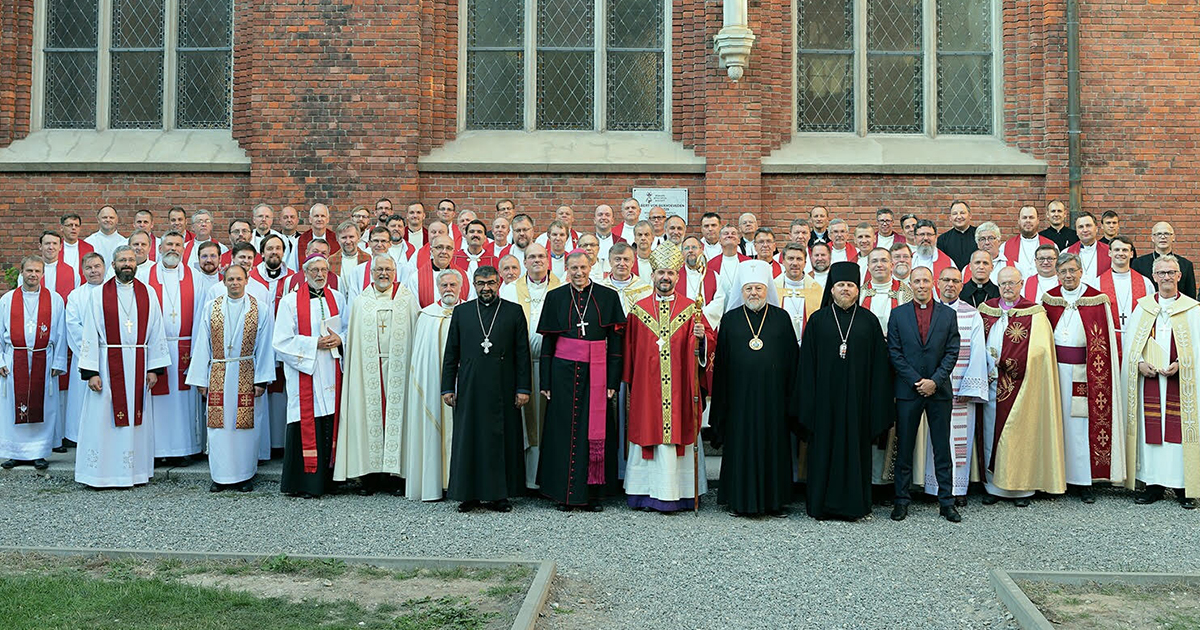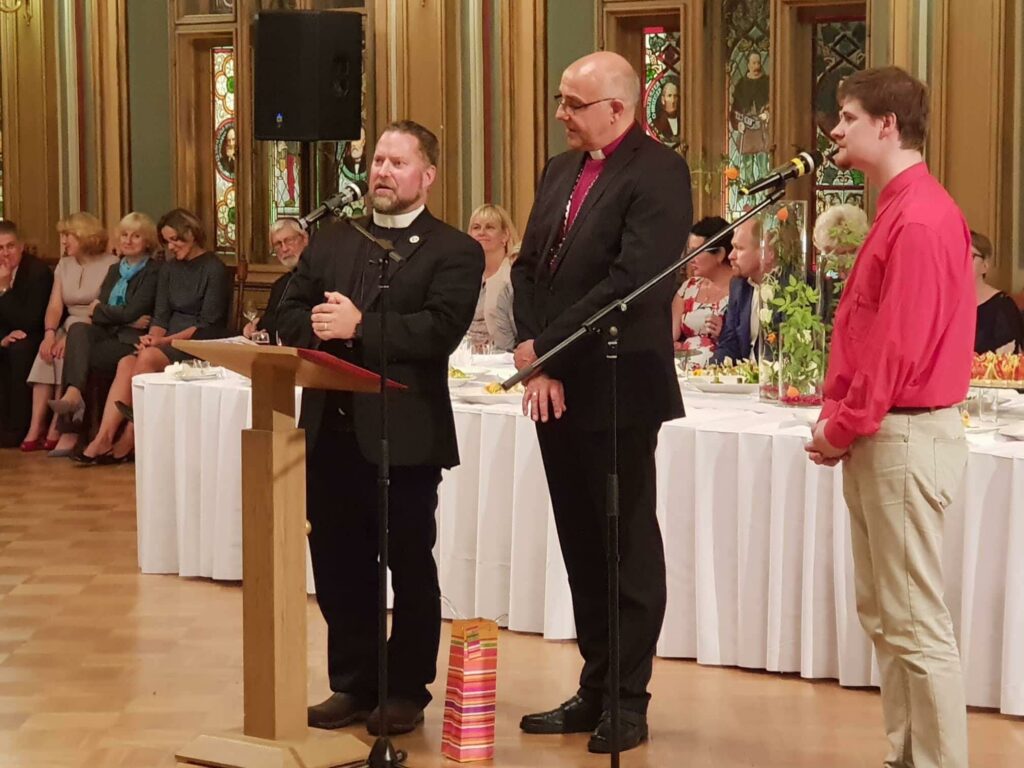
By Mathew Block
RIGA, LATVIA – The Evangelical Lutheran Church of Latvia (Latvijas Evangeliski Luteriska Baznica – LELB/ELCL) celebrated the 25th anniversary of the consecration of Archbishop Janis Vanags in a special jubilee service at the Riga Cathedral in Riga, Latvia, on Aug. 29.
The anniversary coincided with the ELCL’s General Pastors Conference as well as an international gathering of church leaders for the Eastern European and Scandinavian Bishops Conference.
Vanags preached on John 1:35–39, reflecting on Jesus’ call for all people to follow Him. “Jesus’ words ‘come and see’ are the most beautiful thing,” Vanags said. “God calls. Jesus calls.
“He called me in my early childhood, during the Soviet era,” Vanags continued. “In an incredible way, He called me out of the darkness to Himself, to faith and to ministry. It happens that God called me to serve in a unique way. But He also calls to every person, and every call is just as important. … God’s call is your opportunity.”
Jesus’ words to “come and see,” Vanags noted, are an answer to the question of the disciples: “Teacher, where are you staying?” That matters, he said, because God is not to be found everywhere, but only where He has made His dwelling.
Vanags noted that the church is often accused of holding too rigidly to its doctrinal stances and of being too conservative. “But our church does nothing of the sort,” he said.
Instead, it merely seeks to ask the same thing that the disciples asked: “Lord, where do you live?” The church, said Vanags, is called to “come and see” Christ where He has revealed Himself to be.
“Where is this place where Jesus lives?” Vanags asked. “Find it by listening to His preaching. For there — where Christ preaches — there is the holy Christian church. … Let us listen again and again to hear the call of Jesus: ‘Come and see!’”
International Lutheran Council sends greetings
Bishop Hans-Jorg Voigt, the bishop of Germany’s Independent Evangelical Lutheran Church and chairman of the International Lutheran Council (ILC), was present for the event, bringing greetings and congratulations to Vanags and the Latvian church.
The Rev. Dr. Albert B. Collver III, executive secretary of the ILC and director of Church Relations for The Lutheran Church—Missouri Synod, was also present, joining Voigt in bringing greetings on behalf of the ILC. Both participated, along with numerous other church leaders, especially bishops from Eastern Europe, in the service of thanksgiving and prayer at Riga Cathedral.
In his remarks, Collver said: “We give thanks to the Lord for Archbishop Vanags’ years of service to the church. For the past 25 years, Archbishop Vanags has served the Evangelical Lutheran Church of Latvia, leading and guiding the church faithfully through many challenges. He has upheld the scriptural position that only men should be ordained and [has overseen] the change of the church constitution to reflect this truth.
“In Europe,” Collver continued, “Archbishop Vanags is a respected leader among the Lutheran churches, and he has good ecumenical contacts. The ELCL is one of the few European Lutheran churches that has had a growth in members in recent years. We give thanks for the Gospel witness provided by Vanags and the ELCL.”
‘Grit and dirt and the holy cross’
Also praising Vanags was the Rev. James A. Krikava, associate executive director of Regional Operations in Eurasia and Asia for the LCMS Office of International Mission. Krikava recounted a documentary shown during the Riga events.
In the film, he said, “Vanags mentions a conversation he had with other clergy concerning his consecration as bishop 25 years ago,” said Krikava. “One said to him in a wry manner, ‘Now that you have become a bishop, you will no longer eat bad food, and you will no longer ever hear the truth.’
“Archbishop Vanags answered this,” said Krikava, “with the [story of the] healing of the man born blind in John 9. The good bishop noted how strange this was that Jesus would mix His own spittle with the dirt on the ground in order to heal the man.
“But, Vanags noted, this is the way it is in the church. It is grit and dirt and the holy cross by which the church proceeds. Archbishop Vanags has certainly been a man of grit and dirt. He has taken strong stands through the years, and this has cost him dearly.
“Postmodern European liberals,” Krikava concluded, “have criticized Vanags, to say the least. But he remained faithful to our Lutheran values and confessional stance. God bless him for this; it is so easy to go downhill, not so easy to go uphill with a sack of rocks on your back.”
During the ELCL’s General Pastors Conference, Voigt gave a lecture on “International Relations and the International Lutheran Council.” He began by noting the distinction between “nation” and “nationalism,” warning that adding a sense of superiority to one’s understanding of “nation” can lead to nationalism.
Such nationalism must not govern church relationships, Voigt said. Instead, when it comes to the topic of international relations from the perspective of the ILC, it is better to focus on the theological concept of the “catholicity” of the church.
Voigt appealed to the definition of catholicity from the church father Vincent of Lerins, as alluded to and supplemented by the Formula of Concord — namely, that “catholicity” means what has been believed at all times, in all places, and taught by all Scripture. Such an understanding of the church will not lead to confessional arrogance, Voigt noted, but rather to repentance and humility.
Together with Collver, Voigt fielded questions about the ILC. Both Voigt and Collver affirmed that they consider churches with dual membership in the ILC and the Lutheran World Federation to be a valuable bridge between the two world organizations.
Planning for the future
Events continued the next day in Saldus, Latvia, with the Eastern European and Scandinavian Bishops’ Conference. A major focus of discussion was the future of theological education in Europe, and the possibility of combining resources to meet challenges in that area.
Plans were discussed for future meetings in the coming year. Present this year were leaders from Latvia, Lithuania, Germany, Belarus, Ukraine, Russia, Norway, Finland, Sweden and the United States.
During the Bishops’ Conference, Collver presented on the “Present and Future of the International Lutheran Council.” He began with a brief overview of the ILC’s history before describing some of the ILC’s plans for the future.
Among other topics, Collver highlighted the Lutheran Leadership Development Program, which aims to assist Lutheran church bodies around the world in developing leaders who are competent in both confessional Lutheran theology as well as practical leadership skills.
This article first appeared on ILC Online.
Mathew Block (communications@ilcouncil.org) serves as communications manager for the International Lutheran Council. He is also editor of The Canadian Lutheran magazine and formerly served as communications manager for Lutheran Church—Canada.
Posted Sept. 25, 2018
